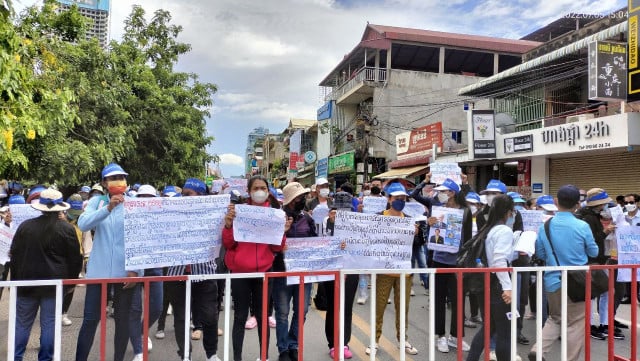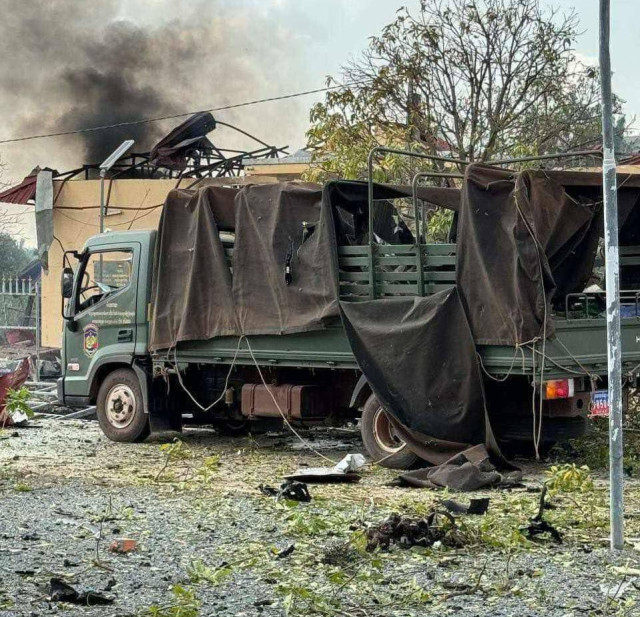Sokhom's Story: Supporting Factory Workers through Information and Access to Social Security Fund

- By Lay Sopheavotey
- April 7, 2024 2:30 PM
PHNOM PENH — Limited understanding and knowledge of the benefits provided by the National Social Security Fund (NSSF) have prevented several Cambodian workers from using them to their fullest potential when they need support, according to the Cambodian labor union leader.
One such worker is Ou Sokhom, who is employed in a factory and suffers from a non-communicable disease, diabetes, and a disability in her right leg.
Living in Phnom Penh in Trapeang Thleung village, Sangkat Choam Chao I, in Khan Por Sen Chey district, Sokhom explained that her disability is the result of a traffic accident that occurred in 2019. At the time, she used her NSSF benefits to help pay her medical expenses.
However, after two months of treatment and financial struggle, as she had had to stop working after the accident, Sokhom decided to return to work even though there still were intramedullary rods inserted in one of her legs to align and stabilize her bone fractures.
"I had to sew with my legs tied to rods, which caused bleeding,” she said. “When the factory manager saw my condition, they asked me to remove the rods before returning to work. Because of financial difficulties, I wanted to remove the rods as soon as possible to earn money. However, the doctor refused to remove them because my fractured bones had not healed yet. So, I sought help from a Khmer traditional medicine practitioner, known locally as Kru Khmer.”
Sitting with a sad face on a small wooden bed in a small bedroom, the 42-year-old worker admitted that she had been careless about her health and didn't follow her doctor's instructions. To this day, she suffers from recurrent leg pain.
Whenever her legs ache, she has to go to a nearby medical center. Some doctors advised her to seek help from medical experts at the Preah Kosomak Hospital, where she had initially received treatment.
"They said it would be easy to monitor and follow my leg condition if I returned to my original doctor," Sokhom said. But she did not go back as she feared the doctor would blame her for taking off the rods against his advice.
“Moreover, I dare not ask for permission to go to the doctor too many times as I am afraid of being reprimanded or even fired by the factory,” she explained.
And yet, Sokhom admitted that her leg condition has deteriorated, causing her severe pain over the past few months and causing her ability to sew clothes at her usual pace to decline. Because of this, she is increasingly worried about losing her job.
“So far, I have not understood much about the labour law, and I only know that NSSF enables us to get free treatment,” Sokhom said.
She along with many other NSSF members can request officials to assess whether they have been affected by a permanent loss of employment capacity in the case of an accident at work. This assessment involves regular medical check-ups and evaluations of the person's condition to determine the changes in disability and review the amount of benefits to be paid to the person.
However, just like many other workers, Sokhom has never requested such a formal assessment of the loss of her permanent work capacity as her knowledge and understanding of the procedure remain insufficient.
In addition to being disabled, Sokhom has diabetes. She only uses the NSSF membership to get health checks and medicine prescriptions for diabetes and is unaware of the many other benefits patients like her can get.
Currently, over 1, 500 medical facilities have partnerships with the NSSF, enabling people with cancer, diabetes and high blood pressure to receive free healthcare and treatment.
Sokhom's case highlights the lack of knowledge about the benefits offered under the National Social Security Fund (NSSF).
According to Ath Thorn, president of the Cambodian Labor Union, it is common for workers in Cambodia to have a limited understanding of the laws relating to labor and social security funds. He suggests that the primary responsibility for addressing this issue falls on key stakeholders such as factories, public officials at the Ministry of Labor and Vocational Training, and medical professionals.
“Some workers are hesitant to seek medical attention at hospitals due to the complex procedures involved in obtaining authorization,” Thorn said. “Additionally, even when workers do go to the hospital, some medical professionals are afraid to provide notes regarding sickness or medical certificates that would allow workers to take time off for treatment.
“This is because they fear inspection or may face problems from relevant parties when issuing leave letters to many workers,” he said. To address these issues, the union leader believes that officials, as well as the factory owners, need to work together to raise workers’ awareness of their labor rights and benefits by holding information sessions for them regularly.















